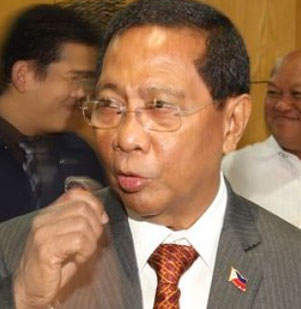BOSTON – There is no chance an armed conflict between the Philippines and China may erupt over the Spratlys issue.
This was stressed by Vice President Jejomar Binay during a lecture at the Harvard University Kennedy School where he is attending a two-week senior executives program on national and international security.

VP Binay
Binay, however, called for strengthening of Philippine-United States security ties.
Binay told top level defense and security officials from 23 countries gathered at Harvard University Kennedy School that although the US was not obliged to take the side of the Philippines on its dispute with China on the Spratlys, it was bound under the 1951 Mutual Defense Treaty to come to the defense of the Philippines if its troops, public vessels or aircraft were attacked in the area.
The Vice President said that although he did not believe a China-Philippine armed confrontation would ensue because of Spratlys, it would be good for everyone to understand what could happen if the improbable happened.
The Vice President said Southeast Asian countries should support “a balance of power in the region” by encouraging China to become a truly positive force for peace and development.
Binay was the only participant asked to give a lecture to the class of 72 highly selected security professionals that included some defense ministers of some countries and major generals in the US armed forces.
In an hour-long lecture on Southeast Asian security, Binay said “there is need for the Southeast Asian countries to engage China individually and collectively to create the necessary structures for peace and stability in the region.”
Binay told the group that despite recent incidents in the West Philippine Sea, otherwise known as the South China Sea, between China and the Philippines, dialogue continues between the two countries through normal diplomatic channels and an exchange of high-level visits.
President Benigno S. Aquino III is scheduled to make a state visit to Beijing on Aug. 31, presumably to discuss with China’s president Hu Jintao the two countries’ conflicting territorial and maritime claims, among other things.
“Convinced that only a rules-based approach to the South China Sea issue can assure us of the best possible results, the Philippines is eager to see the 2002 Declaration on the Conduct of Parties in the South China Sea transformed into an operational Code of Conduct, based on the principles of international law, including the United Nations Conference on the Law of the Sea (UNCLOS),” Binay said.
“Since not all the South China Sea is disputed territory, we should be able to delineate which features are disputed and which waters are not, so that we could then agree on what norms to follow in each case. This should serve as a starting point in considering the Philippine proposal for the establishment of a Zone of Peace, Freedom, Friendship and Cooperation (ZoPFFC),” he said.
Binay said the parties should be able to agree on what constitutes “unfriendly and exceptionable behavior” in the Exclusive Economic Zones (EEZ) and should refrain from pursuing it.
He urged all parties to practice utmost transparency and predictability, more proactive diplomacy and a deeper institutional approach to the issues.
He also asked the parties to look at models and points of cooperation that had worked in other parts of the world, like the Antartica treaty, which 12 countries forged in 1959 and took effect in 1961.
In that region, the parties agreed that the place be used for peaceful purposes only, and completely demilitarized; that full freedom of scientific investigation, cooperation and information exchange be guaranteed; that the treaty should not recognize, dispute or establish any territorial sovereignty claim; and that nuclear testing or nuclear waste anywhere within it be absolutely banned.



 ShareThis
ShareThis